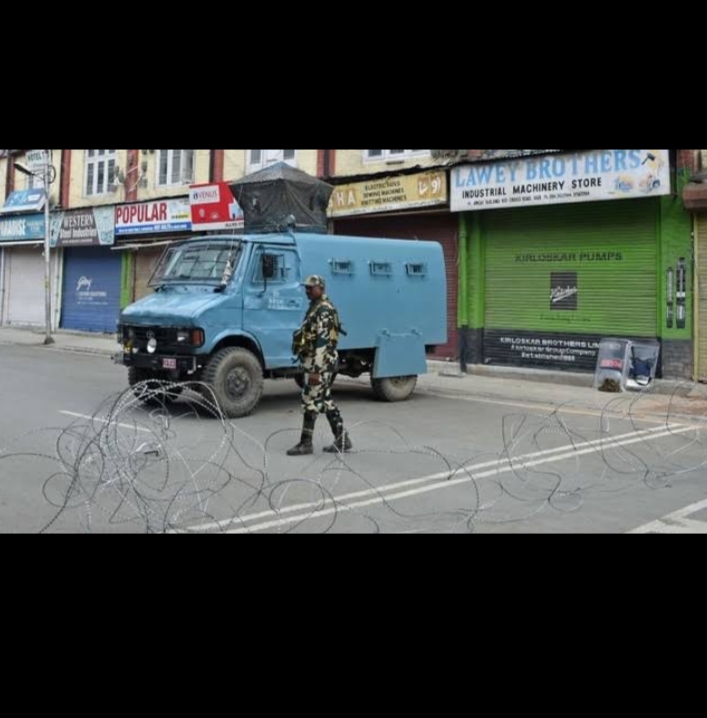Two weeks ago Modi’s government, riled up by Trump’s statement regarding Kashmir, decided to strip the state off it’s autonomy by abrogating article 370 and 35A. This had been long time coming, make no mistake about it. But Trump’s remarks seem to have provided the catalystic effect, expediting the process of abrogation.

Article 370 of Indian Constitution grants a certain level of autonomy to the state of Kashmir, allowing it to make it’s own laws through a “democratically elected” constituent assembly. Technically, ascension of Kashmir to India finds it legal basis through this article. Article 35A on the other hand, restricts any non-kashmiri citizen to own any property in Kashmir.
Abrogation of these two articles wasn’t a decision out of blue. If you analyse the events of last few months leading up to this decision, you’ll be astonished to find how meticulously and cautiously it was planned and implemented.
In order to establish it’s legal foundations, Modi Sarkar dissolved the constituent assembly of Kashmir which left it at the whim of Dehli’s appointed governor to decide the fate of Kashmir. Thereafter, all it required was a presidential order followed by approval of the governor.
New Dehli’s strategy to prevent ensuing protests in Kashmir following the abrogation turned out to be even more shrewd and rather devilish. 3-4 days before this massive decision, security forces in the valley started forcing the tourists and Hindu pilgrims to leave the valley. All of this was done under the pretext that there was threat of a terrorist attack in the valley. Uniformed personnel carrying guns loudspeakers roamed the streets asking the locals to buy groceries and other necessary items before the imminent curfew. Once the curfew was imposed, internet, celluar and phone services were completely shutdown, cutting off the valley from rest of the world. All of this was done while keeping the people in dark about what was coming for them. Fear tarnishing the beauty of the valley wasn’t a new sight for the Kashmiris but this time around it was different.
Modi’s government went a step further and house arrested all the separatists and even the Pro-Indian political leaders of Kashmir. Opposition and activists cried foul but their voices were subdued.
Many international newspapers and opinion makers have called out the state of dwindling democracy in India. But there’s silence when it comes to international countries. And the most criminal silence is prevalent in Muslim world. Business and economic interests are obscuring their obligation to express solidarity with Kasmiris.
Pakistan shares a long history of territorial conflict with India over Kashmir and both countries have fought three wars over this issue. So far Pakistan has shown a very mature response by opting for diplomatic options rather than military ones and has exibited restraint along LOC. But Despite the diligent efforts on diplomatic front, Pakistan has failed to engage international community or earn any sympathy for Kashmiris.
A special meeting of UNSC members on Kashmir was held recently. People in certain political circles of Pakistan claimed it to be a diplomatic victory for Pakistan. But It’s actually quite contrary to that. The meeting concluded without even a public statement, which means there’ll be no further meeting of UNSC on Kashmir, unless a war breaks out between Pakistan and India. India has got away with all the human right violations without even a censure by the international body.
It is hard to put the blame solely on the current government. There are various reasons why Kashmir has failed to become an international issue, compounded by many geostrategic factors. You can boil it down to four;
• Firstly, Non serious attitude and cavalier approach of British empire towards partition caused India to occupy many states by force which sowed the seeds for decades long violent conflict between India and Pakistan.
• Secondly, Ascension of Kashmir to India had very fragile legal underpinnings. UN resolutions were merely of advisory nature and failed to force both India and Pakistan to uphold international law.
• Thirdly, Pakistan’s policies itself have undermined the Kashmir cause to point of no return. 1965 war harmed the Kashmir’s freedom struggle greatly. Shimla agreement proved to be a watershed moment for any UN driven solution of Kashmir-conflict. But the gravest mistake we’ve done was to fuel the insurgency in Kashmir by violent means. It not only harmed our image globally but also invited financial sanctions from global bodies like FATF with our economy already teetering on the brink.
• Lastly, India has emerged as global economic power in recent two decades. Not many countries tend to challange or interfere with global powers. US is backing India to counter economic hegemony of China. Hence, it is reluctant to take sides over Kashmir.
There’s another serious concern that might have raised the alarm bells for Pakistani athorities. In recent statement of Taliban over Kashmir, they have rebuked Pakistan on comparing Kashmir issue with US-Taliban peace talks, calling it irresponsible.
It’s hard to predict how things might turn out in the long run. But right now, we are in a mess.